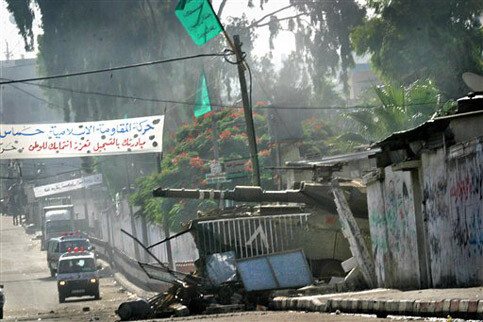UN Office for the Coordination of Humanitarian Affairs 1 October 2004

Israeli Defence Forces (IDF) entered northern Gaza at 22.30 on Tuesday, 28 September establishing positions on high ground overlooking Izbet Beit Hanoun, Beit Lahia and Jabalia. This incursion came in the wake of the continued firing of home made rockets by Palestinian militants towards Israel, and the killing of three soldiers in Morag settlement on 23 September and one settler in Neve Dekalim on 24 September. Missiles have continued to be fired by militants since the start of operation, “Days of Penitence” and two children were killed and 10 others injured in Sderot on 29 September.
Heavy fighting has continued over the last three days and so far, 38 Palestinians have been killed and 154 injured (PRCS); five Israelis have been killed including the two children. The IDF committed reinforcements to northern Gaza in the early hours of this morning with estimates of up to 100 tanks entering the area. Defence Minister Mofaz announced on Thursday evening a “large scale and prolonged operation” aimed at pushing Palestinian missiles out of range of Sderot with plans to create a buffer zone. The focus of the operation so far has been on the Jabalia camp to the north of Gaza city.
According to UNRWA, the camp covers an area of 1.4 km2 with a registered refugee population of 103,646 making it one of the most densely populated places in the world. It is the largest camp in the occupied Palestinian territory (oPt), and it was in Jabalia that the first intifada started in December 1987. The intensity of the fighting in the last three days has made it extremely difficult to undertake a humanitarian assessment in northern Gaza, however, the following information has been obtained from local sources:
Health
Both the UNRWA and Ministry of Health (MoH) clinics have remained open during the incursion, as have the two main northern Gaza hospitals – Kamal Radwan hospital (MoH) in Jabalia and Al Awda hospital (Health Work Committees) in Beit Lahia. The WHO reports that there are currently no shortages of medical supplies at the clinics or hospitals in spite of the high casualty rate. There was concern about reduced supplies of oxygen on Thursday evening at Kamal Radwan however, WHO believes that fresh units have now been delivered.
On Wednesday 29 September and Thursday 30 September, ambulances were able to transfer the injured to the hospitals, although in some instances coordination was required with the Israelis. WHO reported on Friday morning 1 October however, that one paramedic working for the Palestinian Red Crescent Society (PRCS) had been shot in the hand and another staff member was lightly injured by breaking glass when the window of the ambulance was shattered by shrapnel.
Homes and Property
According to UNRWA, 15 homes have been demolished since the start of the operation. The homeless have since been re-housed by UNRWA in rented accommodation in Gaza city. UNRWA reports that the boundary walls surrounding two of its schools in Jabalia have been knocked down by Israeli forces operating in the area. There are consistent reports that the IDF has taken over a number of homes and these are now being used by snipers.
Land leveling has been reported in As Sikka street that lies to the west of Salah ed Din street and which was the site of extensive land leveling during the 8-11 September incursion. Additional land leveling has been reported by UNRWA in the Tel al Zater area. Infrastructure damage has been reported in the Block 4 area of Jabalia camp, the scene of some of the heaviest fighting in the last three days with breaks in the water and power networks. UNICEF is attempting to bring collapsible water containers into this area.
Food
There are currently no reports of shortages, although UNRWA had to cancel a distribution on Thursday on account of the proximity of fighting to its Relief Office from where the distribution was to take place.
Humanitarian access
International humanitarian staff working for the UN have been prevented from entering Gaza since Tuesday, 21 September. This makes a total of 61 days for this year that UN staff have been refused entry, often with little or no prior warning. International NGOs who are not permitted to cross Erez by vehicle have not been able to enter or exit Gaza since 26 September. Medecins Sans Frontier (F/ESP) has a Doctor and Psychologist unable to leave Gaza for the last six days in spite of repeated requests for coordination to the IDF. Medecins du Monde (MDM) face the reverse situation of trying to get a Doctor into Gaza. The prolonged absence of international workers can be expected to impact on humanitarian assistance projects in Gaza, not least in terms of technical, supervisory and managerial input.
Related Links